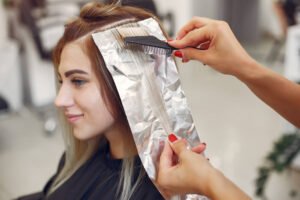Introduction
When it comes to hair care concerns, one that often takes center stage is hair loss. For men, in particular, hair loss can be a distressing experience, impacting confidence and self-esteem. Understanding the causes, solutions, and recovery process of hair loss, specifically telogen effluvium in men, can provide valuable insights into tackling this issue head-on.
Unraveling Telogen Effluvium: What Men Need to Know
Telogen effluvium (TE), characterized by excessive hair shedding, is a common form of hair loss that affects both men and women. While it’s normal to lose around 100 hairs a day due to the natural hair growth cycle, TE disrupts this cycle. The name “telogen” refers to the resting phase of the hair growth cycle, during which hair roots are pushed into a resting state. This phenomenon can be likened to leaves falling from trees during autumn, making way for new growth in the coming season.
Acute and Chronic Telogen Effluvium: What Sets Them Apart?
Understanding the distinction between acute and chronic TE is crucial. Acute TE involves sudden hair loss triggered by a “shock” to the system. Imagine a sudden gust of wind stripping leaves off a tree. This type of TE is often reversible and typically occurs in response to stressors like high fevers, severe infections, surgery, or psychological stress.
Chronic TE, on the other hand, is a persistent loss of hair over a longer period of time. It’s like a slow, continuous breeze that gradually causes leaves to fall. This form of TE can affect women who once enjoyed thick hair in their younger years, and it tends to fluctuate over time without causing complete baldness. Although more common in women, men can also experience chronic TE.
Triggers of Telogen Effluvium in Men
Imagine a symphony where various instruments play together to create a harmonious tune. Similarly, multiple factors can trigger TE in men. Hormonal changes, especially shifts in estrogen levels, thyroid imbalances, and deficiencies in vitamins and minerals like vitamin B12, zinc, and iron, can contribute to TE. Stress, both physical and psychological, plays a significant role in pushing hair roots into the resting phase.
Recovery Journey: Navigating Telogen Effluvium
TE recovery is akin to a phoenix rising from the ashes. The good news is that for most cases of TE, no specific treatment is required. The shedding of hair during TE signals the body’s readiness to regrow new strands. It’s like clearing a garden to make space for fresh blooms. However, identifying and addressing underlying causes are essential steps in the recovery process.
The Role of Nutrition and Lifestyle
Just as a car requires fuel to function optimally, our bodies need proper nutrition. An adequate intake of vitamins and minerals is like fuel for healthy hair growth. Zinc, iron, and vitamin B12 are key players in this orchestra of growth. Avoid crash diets that starve the body of essential nutrients, as it’s like expecting a garden to flourish without water and sunlight.
Stress Management: A Vital Component
Imagine stress as a storm cloud that casts a shadow over the garden. Stress can trigger TE, so it’s crucial to find healthy outlets to manage it. Engaging in mindfulness practices, journaling, yoga, and regular exercise can help dissipate the storm clouds and let the sunlight in.
Professional Intervention and Treatment Options
While many cases of TE resolve naturally, seeking professional guidance is wise. Think of a doctor as a skilled gardener who knows the right nutrients and care to nourish your hair garden. Topical treatments like minoxidil can stimulate hair growth, and Platelet-Rich Plasma (PRP) therapy uses your body’s own resources to rejuvenate hair follicles. Just as a garden may benefit from expert care, consulting a hair specialist can provide personalized insights.
Conclusion: Nurturing Healthy Hair Growth
Imagine your hair as a vibrant garden, and telogen effluvium as a passing storm. By nourishing your body with the right nutrients, managing stress, and seeking expert advice when needed, you can ensure a flourishing garden of healthy hair. Remember, just as a garden requires care, your hair deserves attention and care too.
Disclaimer: The information provided in this article is for informational purposes only and should not be considered as medical advice. Always consult with a qualified healthcare professional before making any decisions regarding your health or treatments. For more information, please read our Medical Disclaimer.
Frequently Asked Questions:
Telogen effluvium is a type of hair loss characterized by excessive shedding of hair due to disrupted hair growth cycles. It occurs in men when factors like hormonal changes, stress, nutritional deficiencies, or medical conditions push hair roots into a resting phase, causing them to shed prematurely.
Acute telogen effluvium is like a sudden gust of wind, causing a rapid shedding of hair triggered by a shock to the system, such as surgery or illness. Chronic telogen effluvium, on the other hand, is persistent, ongoing hair loss that may occur over months or even years without a clear trigger.
Certainly, stress can play a significant role in causing hair loss among men. The intricate dance of stress hormones can intricately disrupt the delicate rhythm of the normal hair growth cycle, nudging hair follicles towards a state of rest. As a consequence of this disturbance, an observable surge in the shedding of hair can become apparent. The art of mastering stress lies in the realm of employing relaxation techniques and embracing a lifestyle that nourishes the body and soul—a combination that holds the potential to serve as a shield against the emergence and evolution of telogen effluvium.
In most cases, telogen effluvium resolves on its own as the hair growth cycle naturally adjusts. However, if you’re concerned, consulting a hair specialist is a good idea. They may recommend treatments like minoxidil to stimulate hair growth or Platelet-Rich Plasma (PRP) therapy to rejuvenate hair follicles.
The regrowth timeline varies, but on average, new hair growth becomes noticeable within a year. Just as a garden springs back to life after pruning, the hair follicles reactivate and produce new strands. During this process, maintaining a balanced diet, managing stress, and following professional advice can expedite the regrowth journey.




